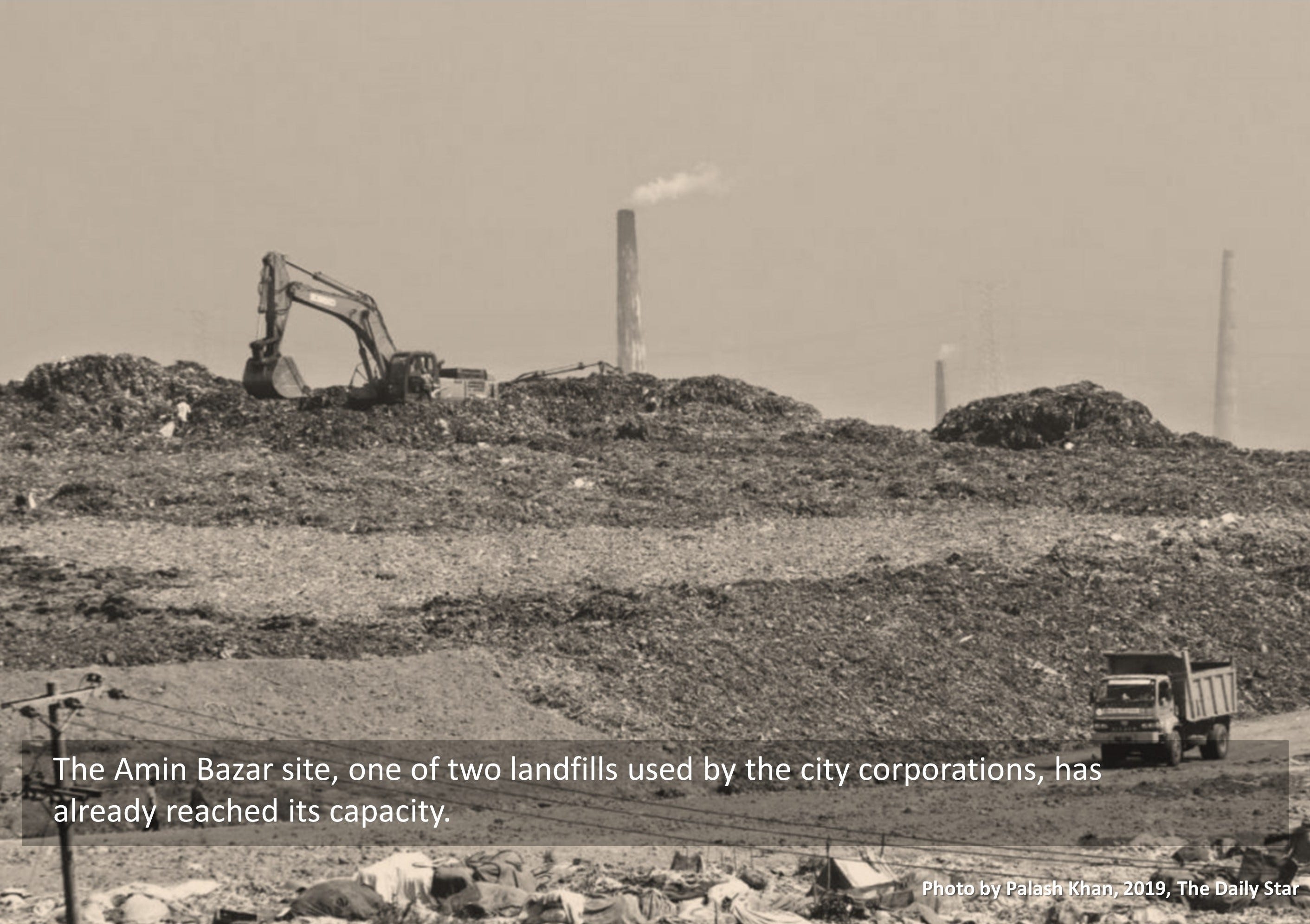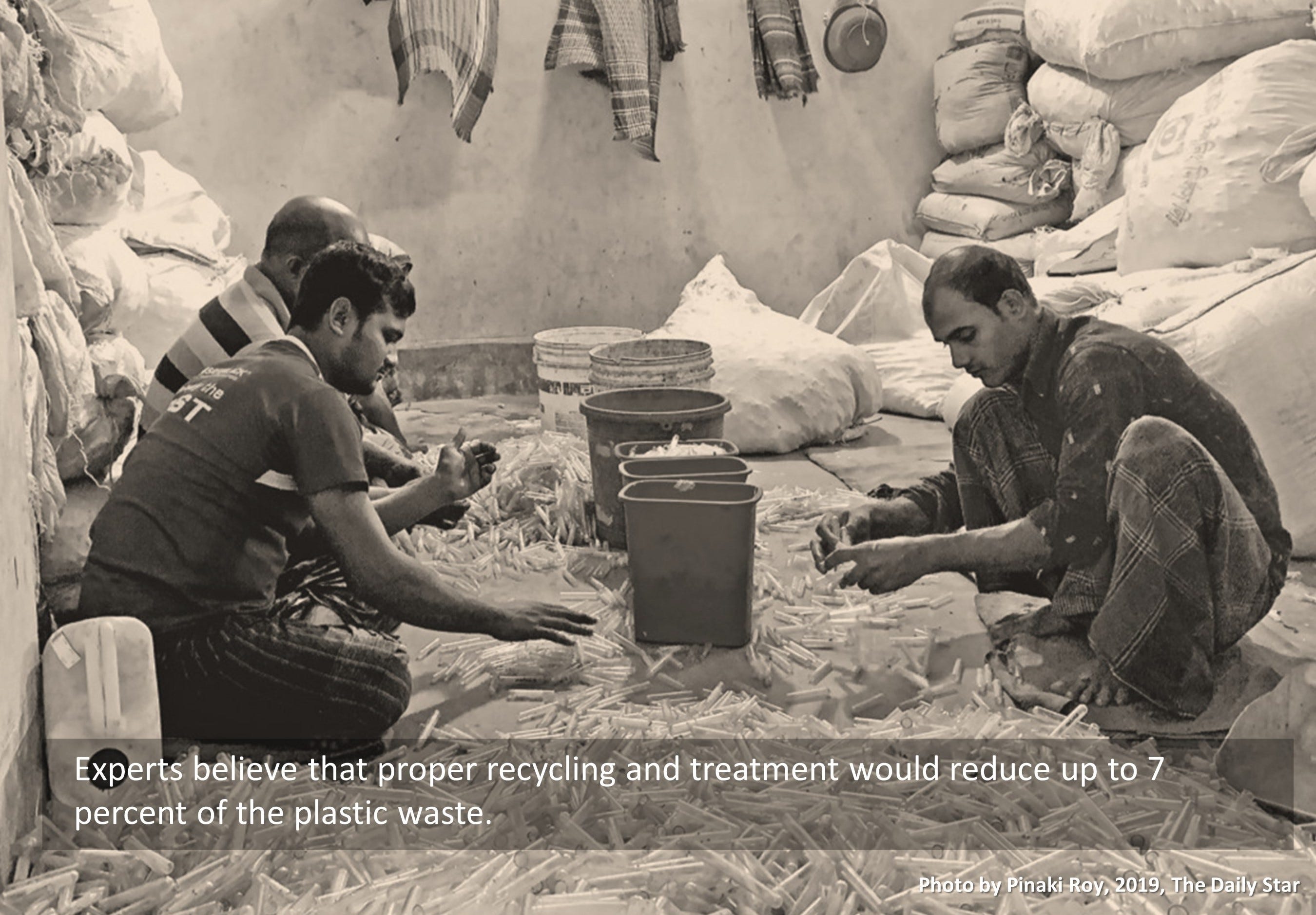Author: Shoaib Mahmudul Hoque
A plastic bottle comes with many conveniences but it also has a devastating impact on the environment. Because of the ever-increasing use of plastic in different industries and lack of regulations for disposal, Bangladesh has recently entered the list of top 10 countries ranked by mismanaged plastic waste. To understand the gravity of plastic pollution in Bangladesh, we have to look at a few aspects including the source, the consumption and the current disposal system. This study focuses on the environmental impact of plastic in the context of Bangladesh and the production & consumption of plastic over the years. It also attempts to find the key reasons behind the growing plastic problem and provide alternatives accordingly.
What happens to the plastic we throw away
There are two possible scenarios to this –
• The plastic ends up in a landfill that are open dumping zones. The dump expands each day as more plastic comes in and continues to take up space. As plastics sit there being compressed among layers of other junk, rainwater flows through the waste and absorbs the water-soluble compounds that are highly toxic. Together they create a harmful stew called ‘’Leachate’’ which later moves into groundwater poisoning ecosystems and harming wildlife.
• The plastic reaches the Bay of Bengal from the land through river runoff or drainage system. Carried by the wind and currents, plastic waste ends up in sea beaches and contributes to the pacific garbage patch. Due to this, certain points of the Cox’s Bazar sea beach gets flooded with tons of plastic waste on a daily basis. Although there are organizations that work towards cleaning the beach, however, it’s a lengthy process and hundreds of marine life dies in this pile of waste in the meantime. Recently researchers have found plastic particles in the stomach of fish in the Bay of Bengal and in salt, which is alarming for both animals and human beings.

How much plastic is a lot of plastic
Plastic consumption in Bangladesh has increased drastically over the years. A study carried out by Waste Concern in February 2019 found that per capita annual consumption of plastic products in Dhaka was 5.56kg in 2005, which increased to 17.24kg in 2017, almost 4 times in less than 15 years. This increasing consumption has led to the generation of more plastic based waste. According to the study, a total of 3,000 tonnes of plastic waste is generated every day in urban hubs of Bangladesh.

In 1992, 1.7 percent of go to waste was plastic-based. Today the number has grown to an alarming 8 percent representing 800,000 tonnes of plastic waste. The study has also identified 70 different single-use plastic-based products (minipack, cutlery, straw, etc.) in Bangladesh. Another study shows that 73,000 tonnes of plastic waste end up in the sea every day through the Padma, Jamuna, and Meghna rivers. The plastic later arrives at different points of Cox’s Bazar and kills marine life in the process. In just July 2020, around 160 sea turtles, many of them dead or injured after getting entangled in plastic waste, have been rescued from the sea beach.
Rationale behind Bangladesh’s plastic crisis
Bangladesh has no policies or regulations regarding the production or consumption of plastic-based products. This lack of regulation has turned Bangladesh into a safe haven for plastic goods producers. Although the country has put a ban on polythene bags in 2002, there still remains 8 more types of plastic (PC, PM, PET, etc.) that can be found in different derivatives according to Eco-Social Development Organization (ESDO). Consumer goods producers recklessly use plastic in packaging, increasingly in mini packs and tubes, when they have alternatives. Because of this, plastic-based products are now more accessible than ever and consumers, unaware of the deadly effects of plastic on the environment, unceremoniously dispose plastics every day.
The Covid-19 pandemic has exacerbated the plastic problem. The worldwide lockdown during the pandemic initially led to positive change to the environment including improved air index quality and a significant drop in CO2 emission due to the reduction in road transport. However, an unsurmountable challenge has emerged as Bangladesh stockpiled plastic products such as PPEs, gloves, goggles etc. to prevent the spread of Covid-19 virus. Growing number of households have also been seen to hoard groceries which too come in single-use plastic packaging.
As the consumption of these plastic products have become an everyday norm for the people, uncontrolled disposal of these items is severely impacting the environment. According to a report published by ESDO, Bangladesh alone has generated around 14,500 tonnes of PPE and other hazardous plastic waste in March 2020. Moreover, the lockdown period has given rise to online shopping and food delivery where most items come in unrecyclable plastic packaging. All these plastics generated in this fallout are piling up in landfills, sea beds and oceans, further adding to the existing plastic pollution and threatening the marine ecosystem.
The Way Out
The problem with plastic in Bangladesh isn’t just the unceremonious disposal but also the uncontrolled production and consumption. If we only refrain from throwing away the bottles on the road then it may not clog the drains or rivers but it will find it’s way to the landfills. So, the only sustainable solution is to work on both the sides. It isn’t possible to ban plastics as they’ve become an unavoidable part of everyone’s life. But it is possible to limit the production and consumption.
A good way to start would be introducing a policy regulating the use of plastic. A government plan in the form of a policy would go a long way solving this crisis. The ban on polythene (2002) has led to a massive drop in the use of the material. Since 2015 the DoE has conducted thousands of mobile courts, filed cases, fined and jailed several people on charges of offences related to production, marketing, sale and use of polythene. If the country takes a similar stance on plastic, both producers and consumers will be discouraged to use the material.

A nationwide ban on single-use plastic including bags, cups, plates, small bottles and straws is at this point, a must, and experts believe it won’t harm the economy. There are environment-friendly alternatives, such as bamboo or glass that can substitute plastic. India, with a similar plastic problem, has already imposed a ban (2019) on single-use plastics. Some countries, including Indonesia, have set a target to reduce 30 percent use of plastic by 2030 while the European Union and Canada have promised to stop single-use plastic by 2021. Countries are coming forward to tackle the plastic crisis and it’s time Bangladesh breaks the silence and does something.
The waste recycling sector in Bangladesh is in dire condition. The recycling of plastics in the country solely depends on the “Informal System” represented by the large informal labor force involved in the solid waste recycling trade chain. A study by Waste Concern found that only 36 percent of the plastic waste was recycled in the year 2019 while the rest was either dumped in landfills or leaked to the environment. Experts in Bangladesh believe that proper recycling and treatment would reduce up to 7 percent of the plastic waste that is dumped. So, it is mandatory that the country gives the due attention to the recycling of plastics.
Mindful consumption and disposal of plastic is a global duty of everyone. From this point on, the citizens should start reducing the use and focus on reusing anything that is made of plastic. One can now track how much plastic they use on a daily basis by using the plastic calculator made by “Earth Day”. The calculator finds out the consumption rate and then suggests cutting off on plastic accordingly.
Consumers in Bangladesh have their part to play to help realize zero-litter. Conscious citizens will lead to a low consumption rate which will later lead to less waste to get rid of.
About the Author: Shoaib Mahmudul Hoque is the coordinator of the Environment Policy Network at Youth Policy Forum